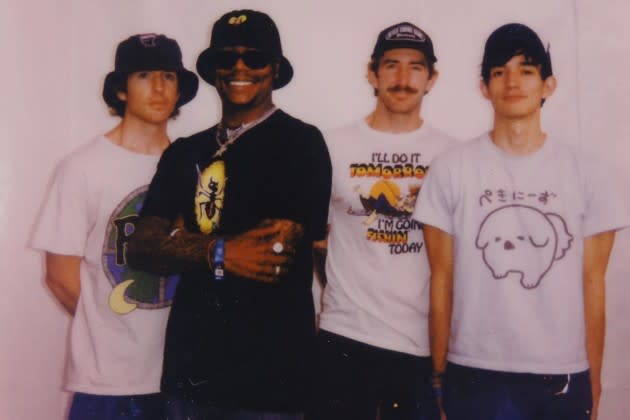Turnstile on How Their Grammy Noms in Both Rock and Metal Categories Break ‘Arbitrary Rules’

Brendan Yates describes it as feeling like Christmas morning. After being roused by their manager’s repeated calls, the members of Turnstile assembled in the lounge of their tour bus — parked on an off-day in North Carolina — in their pajamas, where they learned that they had been nominated for three Grammys. “It was cold and rainy outside and we woke up to a really nice surprise,” drummer Daniel Fang tells Rolling Stone, before clarifying: “I have wool pajamas. Not, like, the repeat pattern kind.”
The Baltimore band — which is up for Best Rock Performance (“Holiday”), Best Rock Song (“Blackout”), and Best Metal Performance (“Blackout”) — has been grinding on the hardcore scene for more than a decade now. They only began flirting with the mainstream in 2021, however, when they dropped their third LP, Glow On. The album cracked the Billboard 200 at number 30 and scored the number eight slot on Rolling Stone‘s best albums of 2021 list.
More from Rolling Stone
Taylor Swift Ready to 'Scream for 10 Minutes' After Song of the Year Grammy Nod for 'All Too Well'
Miranda Lambert Rides 'Palomino' to Multiple Grammy Nominations
Back then, I wrote that “genre is basically meaningless these days, and Turnstile is further proof,” a sentiment further cemented by the fact that the band scored nominations in both the metal and rock categories. “I personally like that because, for a lot of us, genre feels like an antiquated term and perspective,” Fang says. “Generally speaking, trying to fit an artist or a song into a genre feels like you’re playing by arbitrary rules. So I think it’s kind of refreshing to be placed in two different genres because that just highlights that you shouldn’t be restricted.”
Yates agrees. “Growing up, where we came from and what we’re inspired by, it’s a very wide spectrum of music — including punk and metal and rock and all kinds of things,” he says. “So the fact that it somehow could fit into both feels pretty accurate to us.” That affinity for thumbing their noses at conventions — for declining to be shoe-horned into the sometimes gate-keeping world of hardcore — has led the band to work with everyone from Diplo to Blood Orange. They mix big, crunchy riffs befitting circle pits with unexpected instrumentation, like lilting piano, dancing just on the edge of stupid-catchy before skipping backward into weird. That willingness to try anything has served them well; they’re seemingly constantly playing to sold-out rooms and will be opening for Blink-182 next year. (Sidenote: Travis Barker, Fang would very much like to collab with you.)
When not-so-mainstream musicians meet the Grammys, there can be a level of friction — Justin Vernon‘s 2012 Best New Artist acceptance speech in which he openly said he was uncomfortable with the honor comes to mind. Given that Turnstile come from a scene that very much eschews the outdated idea of “selling out,” one might think they would share Vernon’s hesitancy. They don’t.
“I always feel like there’s not really any measure of greatness when it comes to music because music can reach people in so many different ways and different scales. The impact it can leave on someone is impossible to measure,” Yates says. “Once you accept that, you can look at things through a different lens. Being recognized on one scale that’s a universally accepted platform — that somehow a band like ours from Baltimore is being recognized by different people from different worlds — is super cool and exciting.”
The recognition also highlights growth in a genre — to use an “antiquated term” — that has taken a backseat in recent years to pop and hip-hop. The Grammys haven’t aired the rock category on its TV broadcast in years. “What’s looked at as the most popular thing is always going in circles,” Yates says. “Everything is always equally existing — not dying, just taking different shapes. What’s considered mainstream is always shifting. I think it’s good for things to be constantly shifting. It’s showing signs of progression and you never want to get stagnant.”
As for the show itself, Turnstile plan to attend, but they’re not really there for the red carpet and its glittering denizens. “All I’m concerned with is one of or all of our parents somehow being there,” bassist Franz Lyons says. “For a group of people who are just doing this because they love it and being recognized, it doesn’t matter to me [which celebrities] are there as long as someone’s parents are there. They’re the backbone to everything.”
So, when are we going to get the follow-up to Glow On? With the band’s packed touring schedule, we might be waiting a while. “We’re about to kick it for a second,” Lyons says, laughing. “Get our inspiration back.”
Best of Rolling Stone
